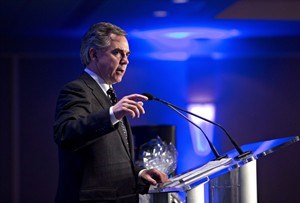
Alberta Premier Jim Prentice gives a state-of-the-province address in Edmonton, Alberta on December 9, 2014. Alberta's prideful boast of being the only jurisdiction in Canada without a provincial sales tax may soon be history. Premier Jim Prentice, after declaring for weeks that a sales tax was off the table, conceded Tuesday that it's up for discussion as low oil prices continue to bleed billions of dollars from the treasury. THE CANADIAN PRESS/Jason Franson
Republished January 14, 2015 - 5:42 AM
Original Publication Date January 13, 2015 - 2:35 PM
EDMONTON - Alberta's prideful boast of being the only jurisdiction in Canada without a provincial sales tax may soon be history.
Premier Jim Prentice, after declaring for weeks that a sales tax was off the table, conceded Tuesday that it's up for discussion as low oil prices continue to bleed billions of dollars from the treasury.
"I don't think Albertans generally advocate a sales tax, but I'm prepared to be educated and to hear from people," Prentice told a downtown lunchtime audience.
He told reporters later that a sales tax is not his preferred choice either.
"I'm not embracing a sales tax. Let's be clear," he said.
"I've simply said I want to hear what Albertans think about cost containment, about deficits and about revenue increments to the government.
"Certainly there are people who have views about a sales tax, and I welcome their opinions."
He said government members will fan out to communities in the coming weeks to hear firsthand from Albertans on what needs to be done, given forecasts that low oil prices may last for several years.
Decisions flowing from those conversations will be reflected in the upcoming budget, but said he's also working on a multi-year plan to balance the books and get Alberta off the roller coaster of fluctuating oil prices.
The government will also listen to arguments on any changes to the tax structure, including Alberta's 10 per cent flat tax on income that critics say benefits the wealthy at the expense of the middle class.
The province, with a $40-billion budget, expects to take in $17 billion in combined corporate and personal income tax this year.
Todd Hirsch, chief economist with ATB Financial, said a gas tax might be the way to go.
"I know a sales tax isn't going to be on the table for anybody, but maybe the introduction of a B.C.-style gasoline tax," Hirsch said. "With gas prices in Edmonton at 72 cents and 79 cents, now is the time to do this."
Hirsch questioned whether a sales taxes would be good idea with Alberta's economy slowing down.
"What they might want to do is say 'when the economy picks back up and we're growing at four per cent, then we'll introduce a sales tax and then maybe some other stable source of revenue.'"
Prentice also said that public-sector workers are among the best paid in Canada and will need to step up in tough times. He didn't elaborate.
"I'm not here to criticize doctors or nurses or teachers," Prentice told the lunchtime crowd.
"(But) in every level of public employment we have we are paying vastly more than anyone else in the country. And it's not sustainable.
"We're going to have to start containing costs and ratcheting costs down, at the same time being innovative and leading the country."
NDP critic Brian Mason said the Progressive Conservatives have failed for decades to diversify the provincial economy, which has left Alberta perpetually hostage to boom-and-bust cycles.
"I don't think that it's fair, nor do I think people will accept, that the middle class and working families in this province are being asked once again to bear the brunt of the government's economic mistakes," Mason said.
Opposition Wildrose critic Shayne Saskiw said there is no need for new taxes or tax increases.
The budget, he said, contains enough bloat and excess that can be cut without compromising service.
"You can't tax your way out of a recession," said Saskiw.
"There's so much waste in this government, we need look at all the waste."
Prentice said the problem cannot be solved by cutting alone.
He noted that Alberta's projected budget surplus this year has turned into a $500-million deficit. Even if oil rebounds to a projected rate of US$65 a barrel next fiscal year, that still leaves the province almost $7 billion short.
"Fifteen per cent of the province's revenue stream has evaporated," he said. "We can't go on like this."
Last week, Prentice said oil prices are not expected to rebound sufficiently to allow the government to balance the books until 2018.
On top of day-to-day deficits, the province also owes $11 billion for borrowing to pay for capital projects.
It also has $5 billion set aside as a rainy day contingency fund. Prentice has said that money will be used to pay off the deficit in this year's budget.
— With files from Lauren Krugel in Calgary
News from © The Canadian Press, 2015